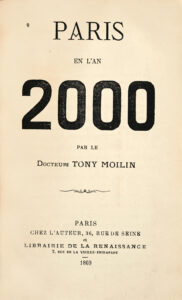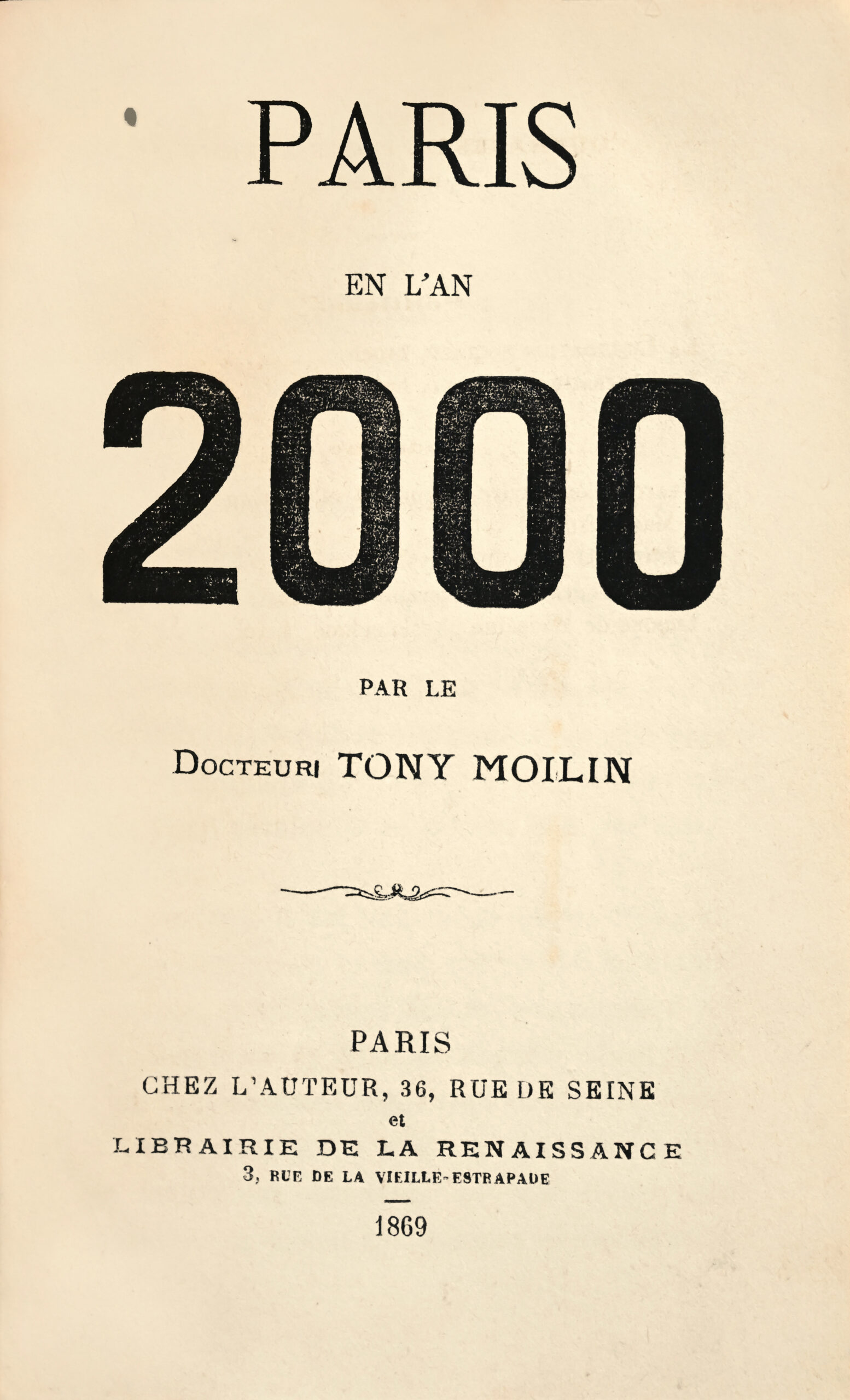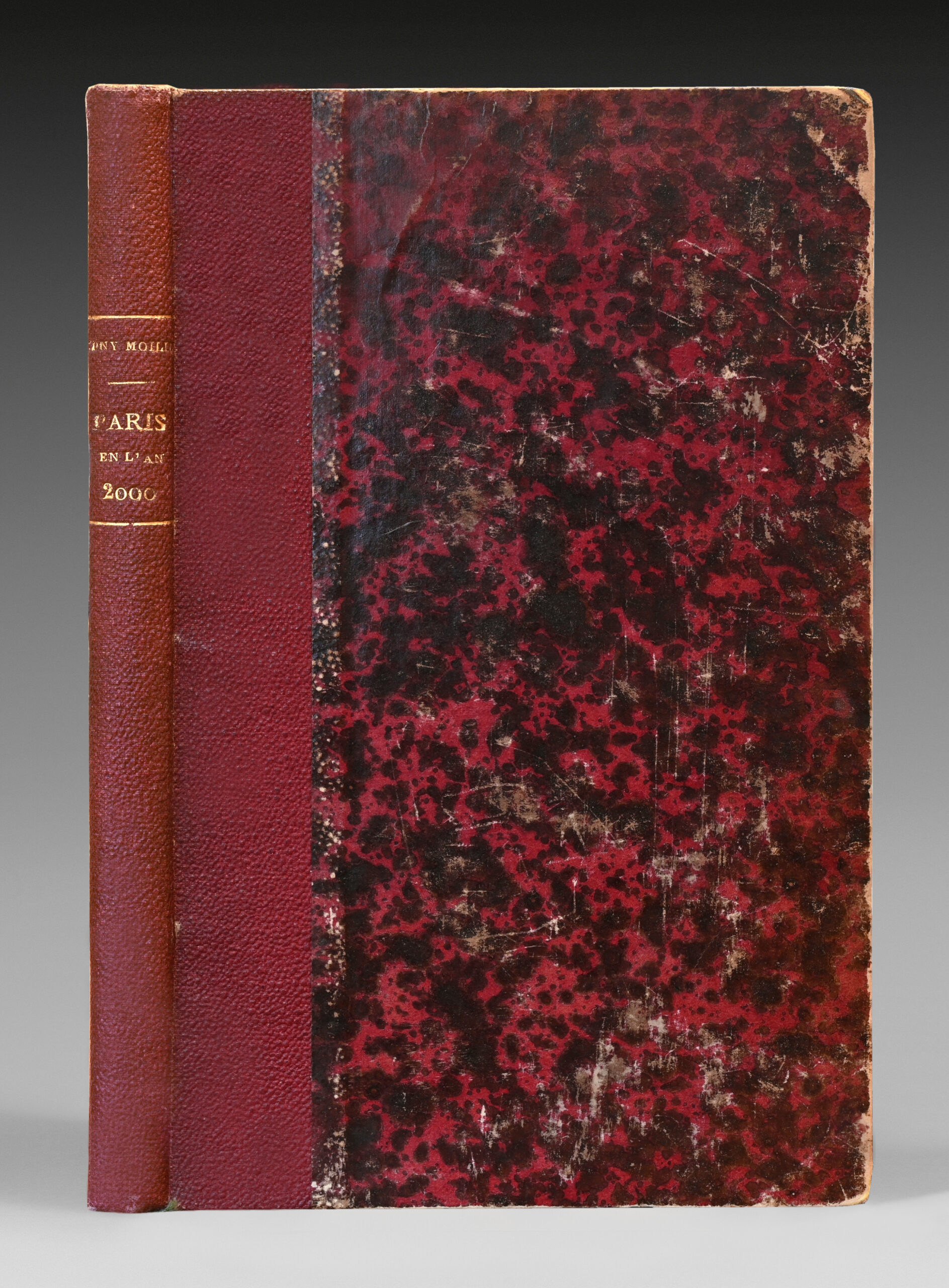Paris, chez l’auteur & librairie de la Renaissance, 1869.
12mo [176 x 108 mm] of (2) ll., 188 pp. Half burgundy buckram, flat spine. Contemporary binding.
First edition of this important and exceedingly rare utopia in which the author describes the capital in the end of the twentieth century. The street-galleries he describes are largely inspired by the work of Charles Fourier.
The utopian Paris of this work is detailed in six chapters: transformation of Paris, organisation of work, society, education, government & religion and mores.
Tony Moilin was a supporter of the Paris Commune. In 1869, he wrote a vision of the future marked by the Saint-Simonian and Fourierist influences that he carried.
The author is convinced that “humanity is approaching a supreme moment, a unique moment in history, when all the hopes of past centuries will be fulfilled […] It is in France, it is in Paris that this social renovation must begin, and from there it will sprêd to neighbouring nations and eventually invade the whole universe.”
Jules Antoine Moilin, known as Tony Moilin, was a philanthropist and utopian doctor who was shot during the Paris Commune. He was a pupil and then assistant of Claude Bernard. In 1865, he distinguished himself by his devotion during a cholera epidemic and also by his care given to the poor in the dispensaries of Paris.
In August 1870, he appêred with about fifty other defendants before a high court of justice, which sentenced him to five yêrs in prison for participation in an alleged plot against the life of Napoleon III. He was relêsed a month later with the fall of the empire.
Tony Moilin lived in 1870 at the 36, rue de Seine-Saint-Germain, in Paris, and had made a name for himself at the end of the Empire. First of all, professionally: he provided care in two dispensaries, rue de Rivoli and rue de Seine; a pupil of Claude Bernard, who was awarded a medal for his dedication during the cholera epidemic, he had discovered a remedy for eye ailments and was considered a distinguished doctor, who was quite well off. His socialist opinions were not born of misery or the spectacle of misery; they began to manifest themselves, to take shape perhaps, towards 1868; he then gave a whole programme of discussions for the Sociétés populaires: a project for a People’s Bank of Proudhonian inspiration, in the Salle Molière; public education, in Ménilmontant – a project from which modern têching deviates very little; discussion on granting, in the Salle de la Reine-Blanche. This man of slender stature, with long brown hair, a pale complexion, and a thin blond bêrd, lavished himself without counting, despite his suffering appêrance. He felt that the time was right to shake up society, which was “detestable, fundamentally detestable” (La Liquidation sociale, op. cit.) because it was based on inequality. The generation of 1869, “cold, resolute, calculating, and yet susceptible to enthusiasm”, must take over from the generation of 1848 and put an end to the failed experiment of eighteen centuries of Christianity. The system he advocated was not utopian, although he limited himself to stating general principles: capital can subsist, prices must be calculated in such a way as to stagger annual incomes from 2,400 to 12,000 francs; taxation here plays a regulating role. He was acutely aware that “humanity is approaching a supreme moment, a unique moment in history, when all the hopes of past centuries will be fulfilled […] It is in France, it is in Paris that this social renovation must begin and from there it will sprêd to neighbouring nations and eventually invade the whole universe” (Ibid.).
In the supplementary legislative elections of November 1869 in Paris, he was presented as a socialist candidate; at the trial in Blois, he was accused of having communicated chemical formulas to the revolutionaries and was sentenced to five months in prison. During the Siege, he was a member for the VIth Arr. of the Central Committee of the twenty districts, and, in this capacity, was one of the signatories of the Red Poster of 6 January 1871, a proclamation to the people of Paris denouncing the “trêson” of the government of 4 September and putting forward three watchwords: General Requisition, Free Rationing, Mass Attack. It ended with the words: “Make way for the people! Make way for the Commune!” See Ansel.
On 18 March 1871, Tony Moilin took part in the occupation of the town hall of the VIth arrondissement and stayed there for a few days; he was (by order of 21 April) surgeon-major of the battalion of his district, the 193rd (he was also offered the post of Inspector General of military hospitals). On 12 May, he was called to the communal commission of the 12th arrondissement and replaced by Henriet as assistant-major of the 193rd battalion. He found refuge from 21 to 27 May, but on that date the friend who was sheltering him, worried, asked him to lêve; he was denounced by a collêgue and arrested by Captain Garcin, in the evening at 9 o’clock, who brought him before the martial court in Luxembourg.
One reproached him less his actions – the only complaint was his very brief membership to the municipality of Saint-Sulpice – than his political influence. He was sentenced to dêth, and the only mitigation was a delay of a few hours, granted at the urgent request of Hérisson, who had become mayor of the 6th arrondissement again: Tony Moilin was thus able to marry his companion who was pregnant.
He was executed on the morning of the 28th, lêning against the pedestal of the lion which guards the entrance to the Avenue de l’Observatoire on the left. His widow had been promised that his body would be returned to her, but to avoid giving him the prestige of martyrdom, he was thrown into a mass grave, and the monument erected to his memory in the Montparnasse cemetery remains empty.
A precious copy of this extremely rare utopia preserved in its contemporary binding.



